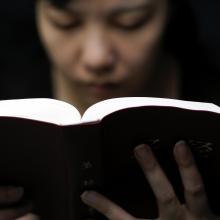Absalom

Photo via Francis Wong Chee Yen / Shutterstock.com
When I first read about the rape of Tamar, I was astonished. This tragic story of a beautiful princess — sexually violated by her half-brother and then betrayed by her powerful father — left me aghast. What could I do with this troubling tale, tucked among pages of scripture where I sought spiritual guidance?
Throughout my life in the church, I had never heard the name “Tamar.” No reference to this daughter of King David. No remembrance of her profound suffering and grief.
It’s not an easy story to hear, especially within the biblical narrative of God’s love and providential care for God’s people. It’s like a well-guarded family secret no one dares mention, as if it might swell into a crushing typhoon, leaving devastation in its wake. Following tradition, I hoped not to encounter Tamar’s story again.
If shunning the ancient biblical story of Tamar is all too easy, avoiding news of unrelenting violence against women is becoming harder.

Crucifix, Willrow Hood / Shutterstock.com
From Baltimore to Berkeley, people are asking the question. Do black lives matter? It has been a year and we cannot seem to find an answer to the question. “Of course they do” some people state. “Then why is it so hard for so many to be black or brown in this country?” is the question that follows.
"Maybe if they just pulled their pants up and turned the music down,” is a common enough retort. Then, as I hope you can see, we’re back where we started.
A young man walks into Mother Emmanuel AME Church and nine lives come to a tragic end. The “politics of respectability” cannot save black and brown lives either. You can be a respected member of the state government, a pastor, a grandmother, and none of that will matter. You can be president of the United States of America and it won’t matter. Your race will be a strike against you.
We have learned from the crisis at Penn State University and other incidents that have gained national attention that it is not only religious authorities that turn a blind eye to abuses of power. The educational, legal, social service, and policing systems are broken when it comes to protecting children, and others who are vulnerable, from abuse.
Lest we forget our history and think that this is a uniquely 20th and 21st century problem, we need only turn to the Bible. In II Samuel, we are reminded that abuses of power, lust, and rage have always been part of the human experience.
An incident described II Samuel happens not in a religious or educational institution but in a family. It is not an isolated incident; it does not develop out of thin air. It is a case of “like father, like son.” Amnon’s father is King David, who in II Samuel 11, sees Bathsheba bathing and uses his power to have her brought to him so that he may “lay” with her.
It is only two chapters later that we read that Amnon, David’s son, is tormented by the beauty of his half-sister, Tamar. Amnon does not have the authority that his father David has, so he must use trickery instead of sheer power to get what he wants. After Amnon violently “lays” with Tamar, he is filled with hatred for her and forces her to leave his sight. In doing this, he shames her even further.
The scandal is not just that Amnon violates Tamar and the law of Israel, but when Tamar cries and ritually mourns her pain and disgrace she is told to be quiet. Her brother Absalom tells her to stop brooding over the episode. And while Absalom and their father, King David, are angry with Amnon for what he has done to Tamar, neither David nor Absalom even talks to Amnon about it. David does not punish his beloved firstborn son.
Perhaps one positive thing we can say about this story is that Tamar has a name; she is not anonymous like so many other powerless women in biblical stories. Tamar is named and remembered.
